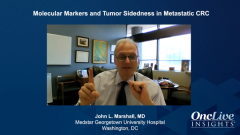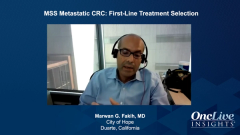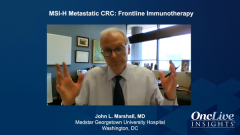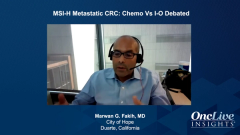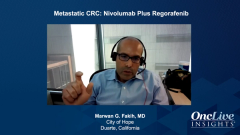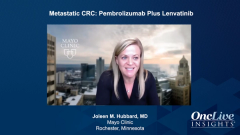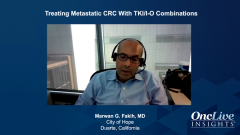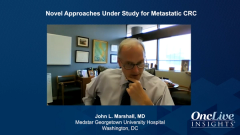
Metastatic CRC: Frontline Therapy With EGFR Inhibitors
Mayo Clinic’s Joleen M. Hubbard, MD, interprets data recently presented on the use of EGFR inhibitors as frontline therapy for appropriate patients with metastatic colorectal cancer.
Episodes in this series

John L. Marshall, MD: Joleen, this brings up a question. We didn't all go to Chicago [ASCO] and then debrief, which we almost always do when we're there together. I was fascinated by this depth of response study—the study of FOLFOXIRI [folinic acid, 5-fluorouracil and irinotecan]/bevacizumab versus cetuximab done in Asia. This study demonstrated that the addition of anti-EGFR therapy increased the depth of response. When they presented the data regarding its use for right- versus left-sided tumors, I was also struck by the fact that EGFR therapy worked. It didn’t work as well for right-sided tumors, but it worked. It wasn't worse. This made me think about the whole right- versus left-sided tumor debate. Does an EGFR inhibitor hold water with FOLFOXIRI, for example, in the frontline setting? Is this an Asian phenomenon that we don't understand yet? Does this open the window to more EGFR frontline therapy if you thought the setting was right, including for right-sided tumors? How did you interpret all of that? Marwan brought it up, so that is why I am wondering about this. I'm not a big EGFR frontline user, I have to say, but what were your thoughts on that?
Joleen M. Hubbard, MD: I also thought the depth of response was interesting. When you actually look at R0 resections, they were not higher. And, survival outcomes were not higher.
While I do think it's interesting, I don't really know what to do with that data if it's not going to lead to improved outcomes, higher rates of metastasectomy, etc. I hesitate to use EGFR inhibitors up front because I like to give my patients maintenance therapy. I like to get them off more intensive therapies for a while and give them a break. That's hard to do with an EGFR inhibitor.
Personally, that trial didn't influence my practice because it didn't lead to those higher rates of curative resections, which is really my goal in the frontline setting if I have somebody who may potentially be operable.
Transcript Edited for Clarity


